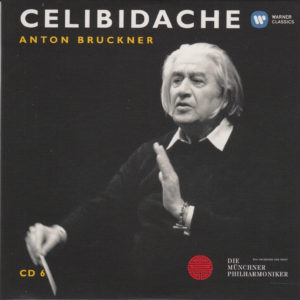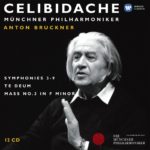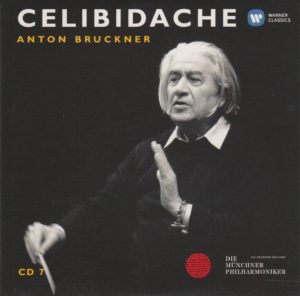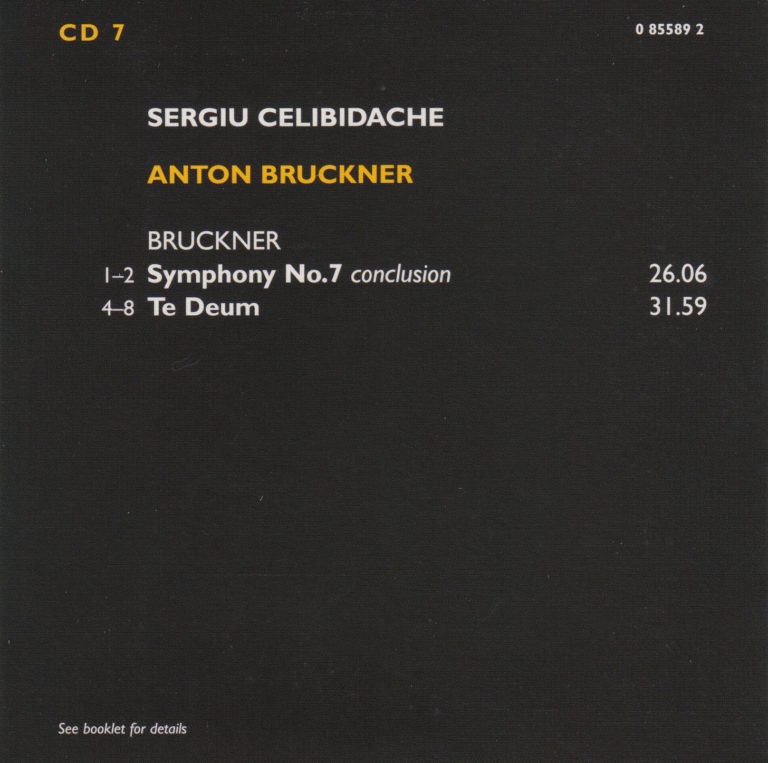
My “office” this morning is my favorite book store for a killer coffee and scone and some research time and conversation.
 This morning, I am listening to Anton Bruckner’s Symphony No. 7 in E Major (WAB 107) interpreted by the Romanian conductor Sergiu Celibidache (1912-1996).
This morning, I am listening to Anton Bruckner’s Symphony No. 7 in E Major (WAB 107) interpreted by the Romanian conductor Sergiu Celibidache (1912-1996).
According to one web site, his name is pronounced: SER-zhoo Chay-lee-bee-DAH-ke.
If they say so.
If you want to read the background info on Maestro Celibidache (and I really think you should – he was a fascinating guy), or read my opinion of his interpretation of Bruckner’s Third, visit Day 13.
If you want to read my opinion of Celibidache’s interpretation of Bruckner’s Fourth, visit Day 19.
If you want to read my opinion of Celibidache’s interpretation of Bruckner’s Fifth, visit Day 27.
If you want to read my opinion of Celibidache’s interpretation of Bruckner’s Sixth, visit Day 35.
If going backward isn’t your gig, then read on…
First, the objective stuff.
Then, my opinion of the performance and box set and liner notes, etc.
The objective stuff:
 Bruckner’s Symphony No. 7 in E Major (WAB 107), composed 1879–1881
Bruckner’s Symphony No. 7 in E Major (WAB 107), composed 1879–1881
Sergiu Celibidache conducts
Celibidache used the “ed. Haas” version, according to the liner notes.
Munchner Philharmoniker (Munich Philharmonic) plays
The symphony clocks in at 80:47
This was recorded in Munich, Germany, on September 10, 1994
Celibidache was 82 when he conducted it
Bruckner was 59 when he finished composing it (the first time)
This recording was released on the Warner Classics label
Bruckner wrote his symphonies in four movements. The time breakdown of this one (Symphony No. 7 in E Major), from this particular conductor (Celibidache) and this particular orchestra (Munchner Philharmoniker) is as follows:
I. Allegro moderato………………………………………………………………………………..24:16
II. Adagio. Sehr feierlich und sehr langsam…………………………………………..28:46
III. Scherzo. Sehr schnell………………………………………………………………………..11:35
IV. Finale. Bewegt, doch nicht schnell……………………………………………………14:31
Total Time: 80:47
According to its entry about the Haas edition on Wikipedia,
Haas edition (published 1944)Robert Haas attempted to remove the influence of Nikisch, Schalk and Löwe in order to retrieve Bruckner’s original conception of the symphony. Haas used some material from the 1883 autograph but because this autograph also includes later changes much of his work was the product of conjecture. The most prominent feature of Haas’s edition is the absence of cymbals, triangle and timpani in the slow movement: Haas asserted that Bruckner decided to omit the percussion, a claim scholar Benjamin Korstvedt deems “implausible”.
 Okay. Now, here are the subjective aspects:
Okay. Now, here are the subjective aspects:
My Rating:
Recording quality: 5
Overall musicianship: 4
CD liner notes: 3 (thin booklet mostly about Celibidache, with a wee bit about Bruckner, translated into English, German, and French – fascinating for me, but unfulfilling as a primer on Bruckner’s symphonies)
How does this make me feel: 5
Here’s what I don’t like about this performance: it’s split over two CDs, with :50 of applause at the front end and 1:16 of applause at the end.
Plus, as you can see from the back of one of the two CD sleeves, there’s limited information available.

I get that lazy “See booklet for details” message that merely means the record label didn’t think enough of its customers to list the track names and running times.
Frankly, the information is so limited on both the CD sleeve and the liner notes in this box set that I can’t even tell, cumulatively, how many minute the entire performance is. I have to total up all six tracks (two of applause, remember>) myself.
As for the music…
Ahhh.
It’s wonderful.
Every movement – especially the off-the-charts Scherzo, which is both powerful and playful. Sometimes at once.
The entire performance has a spaciousness about it. It’s roomy. Expansive.
Sometimes a little too expansive. At the end of the Scherzo, for example. There’s 35 seconds of coughing and shuffling and preparing for the start of the fourth movement.
Ditto for the end of the first movement: 33 seconds.
That kind of live feel isn’t found at the end of the second movement, however. It’s just that sublime horn and pizzicato ending that sends the last, lingering notes heavenward. It’s an incredibly moving end to an Adagio.
But there’s no live sounds afterwards.
There is at the end of the Scherzo, though.
And the end of the Finale…which immediately cuts to the 1:16 of applause that serves as a sixth track in this performance of Bruckner’s Seventh.
I don’t think I’ve ever heard a more truly live “live” recording of a Bruckner symphony. This captures everything – with a kind of undefinable magic that sets it apart on another level thrown in for good measure.
Another highly recommended performance from the Munich Philharmonic as interpreted by the Zen conductor himself.

Hi Bill,
I like Celibidache a lot but I have to be in the right mood to really appreciate his conducting. I am a little surprised you didn’t enjoy his 4:th and 5:th! I think his 4:th is one of the best and the end of the last movement is really something special. I don’t have any problem with his time spans but I listen a lot to Wagner …
/Niklas